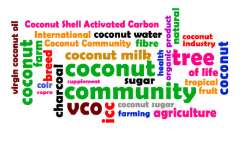Detection of the Phytoplasma Associated with Lethal Yellowing-Type Syndrome of Coconut in Ghana in Three Weed Species
Abstract
The lethal yellowing-type syndrome of coconut in Ghana, locally called Cape St. Paul wilt disease (CSPWD) is considered as the foremost threat to the survival of the coconut industry in the country. The syndrome is associated with a phytoplasma belonging to the 16SrXXII-B subgroup. In Ghana, no alternative hosts of the phytoplasma have been identified. To identify alternative hosts of the phytoplasma associated with CSPWD, 21 plant species belonging to 16 plant families were sampled from within and around the vicinity of 10 CSPWD affected farms in the Western, Central and Volta Regions of Ghana. Nested PCR and sequencing using assays based on the 16SrRNA gene were used to detect the CSPWD associated phytoplasma in the plant species, Laportea aestuans, Starchtarpheta indica and Pentodon pentandrus. Removal ofthese non-coconut plant species will be incorporated into existing management strategies for CSPWD in Ghana. The plants will be further investigated for their role in the epidemiological cycle of the disease.











